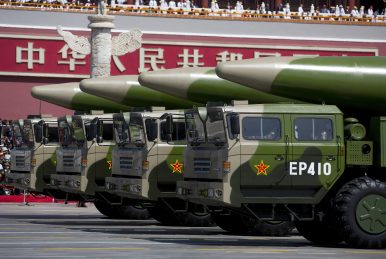By Mercy A. Kuo
 Trans-Pacific View author Mercy Kuo regularly engages subject-matter experts, policy practitioners, and strategic thinkers across the globe for their diverse insights into the U.S. Asia policy. This conversation with Dr. Gregory Kulacki – China Project Manager at the Union of Concerned Scientists – is the 177th in “The Trans-Pacific View Insight Series.”
Trans-Pacific View author Mercy Kuo regularly engages subject-matter experts, policy practitioners, and strategic thinkers across the globe for their diverse insights into the U.S. Asia policy. This conversation with Dr. Gregory Kulacki – China Project Manager at the Union of Concerned Scientists – is the 177th in “The Trans-Pacific View Insight Series.”
Briefly explain the U.S. rationale for withdrawal from the Intermediate-Range Nuclear Forces (INF) Treaty.
Two main justifications have been offered. The first is a Russian violation of the treaty. The second is that the treaty is antiquated because China is not a party.
Explain the INF Treaty’s strategic relevance in a post-Cold War, post-September 11 world order.
The treaty prevents the United States and Russia from fielding ground-based missiles with ranges between 500 and 5,500 kilometers. This constraint helped maintain strategic stability in Europe. At the time [it was signed], it cut short plans by both sides to build large numbers of these weapons. Today, although the Cold War may be over, Russia and the United States still maintain large nuclear arsenals kept on high alert. Neither nation will commit to a no-first use policy. The risk of nuclear war, especially through accident or misunderstanding, remains intolerably high. Legal constraints on arms racing, like the INF, help lower that risk. Nuclear arms control is just as important to preserving international peace and security today as it was in 1987 when the treaty was signed, perhaps even more so.
The INF was a piece of a much larger arms control structure built by policymakers in many countries who recognized the danger of arms racing. That structure began to fall apart after the United States failed to ratify the Comprehensive Nuclear Test Ban Treaty (CTBT) in 1996. Not long afterwards the United States unilaterally withdrew from the Anti-Ballistic Missile Treaty (ABM). International negotiations on the Fissile Material Cut-Off Treaty (FMCT) ground to a halt. The demise of the INF Treaty is another dangerous step in the wrong direction. If this trend continues, it may not be long before leaders like Mr. Putin and Mr. Trump begin to push to resume nuclear testing.
What are the implications for Asia, specifically China, India, North Korea, and Pakistan?
These four nuclear weapons states also have missiles in this class. The U.S. decision to abrogate the INF Treaty is a signal to the leadership of all four nations that arms control and disarmament is no longer an important global norm. If Russia and the United States continue to undermine that norm, all four of these nations may feel less constrained in the development of their nuclear weapons and ballistic missile programs.
The probability of another nuclear weapons state in Asia remains low. There is still strong support among the non-nuclear weapons states to uphold the Nuclear Non-Proliferation Treaty (NPT) and to pressure the nuclear weapons states to honor their NPT obligation to return to the negotiating table. The passage of the UN Treaty on the Prohibition of Nuclear Weapons (TPNW) is an important step forward.
What is the impact of the U.S. decision on allies?
Most NATO member states are not supporting the Trump administration’s decision to withdraw from the treaty. Their opposition may constrain U.S. efforts to re-introduce ground-based intermediate-range missiles in Europe. The Japanese prime minister, on the other hand, reportedly nominated President Trump for the Nobel Peace Prize. He also endorsed an aggressive new U.S. nuclear posture that may result in the re-introduction of U.S. nuclear weapons into Asia, including Japan itself.
Without the INF’s constraints, the U.S. may begin to pressure Japan, Taiwan, and other Asian allies to deploy U.S. ground-based intermediate-range missiles on their territory. Those missiles need not be armed with nuclear weapons. Most of China’s missiles in this class are armed with conventional high explosives. The United States will try to persuade its Asian allies by arguing new missiles are needed to counter China’s. That’s a dubious argument given the already robust U.S. military posture in Asia. Increased numbers of conventionally-armed missiles kept on high alert will create new uncertainties that increase the risk of rapid escalation in a future military conflict.
Moreover, neither side would know for sure whether the incoming missiles were armed with conventional or nuclear warheads. This is one of the greatest dangers posed by China’s current nuclear posture, and the most important reason to try to convince China to enter into international negotiations.
What, if any, new strategic security framework will replace the INF Treaty?
The strategic security framework based on arms control will be replaced by a new framework based on arms racing. Lessons learned during the Cold War will need to be learned all over again. Trillions of dollars will be wasted. The risk of nuclear war will increase. Hopefully, under increased pressure from the non-nuclear weapons states pushing to make nuclear weapons illegal, arms control norms will become stronger and arms racing will be recognized as the dangerously irresponsible evil that it is.
No comments:
Post a Comment